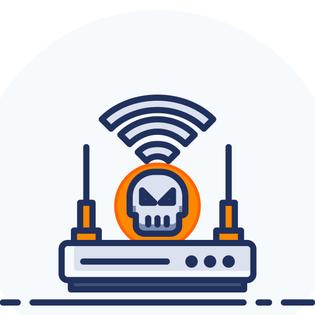-
Fast, cloud-based scans
-
Ransomware reversal technology
-
Internet Security Plus plan required to clean device
Advertiser Disclosure
All About Cookies is an independent, advertising-supported website. Some of the offers that appear on this site are from third-party advertisers from which All About Cookies receives compensation. This compensation may impact how and where products appear on this site (including, for example, the order in which they appear).
All About Cookies does not include all financial or credit offers that might be available to consumers nor do we include all companies or all available products. Information is accurate as of the publishing date and has not been provided or endorsed by the advertiser.
Editorial Policy
The All About Cookies editorial team strives to provide accurate, in-depth information and reviews to help you, our reader, make online privacy decisions with confidence. Here's what you can expect from us:
- All About Cookies makes money when you click the links on our site to some of the products and offers that we mention. These partnerships do not influence our opinions or recommendations. Read more about how we make money.
- Partners are not able to review or request changes to our content except for compliance reasons.
- We aim to make sure everything on our site is up-to-date and accurate as of the publishing date, but we cannot guarantee we haven't missed something. It's your responsibility to double-check all information before making any decision. If you spot something that looks wrong, please let us know.
When you want to protect your device, but need to get the best bang for your buck, Webroot Internet Security Plus is a good option. You get antivirus protection along with features like ransomware reversal and a firewall.
With all these features, how does this antivirus software perform? Keep reading to find out how Webroot SecureAnywhere antivirus may help keep your devices safer.
Webroot antivirus overview
| Price | $23.99–$77.99/yr |
| Free plan | No |
| Max # of devices protected | 1–5 devices |
| Malware scans | Manual and scheduled |
| Firewall | Yes |
| Phishing protection | Yes |
| Details | Visit Webroot |
Webroot was fast when performing scans, and we like the cloud-based architecture that allows it to scan without affecting our device performance. If you want a low-cost, no-fuss antivirus, you truly can’t go wrong with Webroot.”
Who is Webroot best for?
Webroot Internet Security Plus features
Webroot antivirus test results
Our Webroot Internet Security Plus antivirus experience
Webroot compatibility
Webroot customer support
Webroot antivirus cost
Webroot antivirus FAQs
Bottom line: Is Webroot antivirus good?
Who is Webroot best for?
- Recommended for busy individuals who want fast device scanning without a lot of fuss.
If you want a solid antivirus that’s easy to use and offers features like a firewall, password manager, and automatic scanning, Webroot's antivirus products may check all the boxes. It earned a high score during third-party testing for its malware protection and includes always-on protection for identity theft.
Webroot pricing starts at $39.99 for a year of protection with its AntiVirus plan, but you’ll need to upgrade to the Internet Security Plus or Internet Security Complete plan to get apps for your cell phones and tablets.
Internet Security Plus costs $59.99 a year and covers three devices, while Internet Security Complete costs $79.99 a year and covers five devices.
Extra device protection could cost you an extra $40 compared to the basic AntiVirus plan — but keep in mind that’s per year, not per month. And both Internet Security Plus and Internet Security Complete come with extra features that make the higher price easier to swallow.
Speaking of features, one of our favorites was the minimal effect Webroot has on your system resources. That comes thanks to Webroot’s cloud-based architecture, which means it won’t use much disk space when scanning your machine.
Some antivirus programs can strain your computer’s memory, making it run slow. When checking for a computer virus, you don’t want your system bogged down for long periods.
Webroot antivirus pros and cons
- PC and Mac support
- Fast, cloud-based scans
- Identity theft protection
- Real-time anti-phishing to block malicious sites
- Online activity not eliminated with cheapest plans
- Internet Security Plus plan required to clean device
- Costs extra for Wi-Fi security
Webroot Internet Security Plus features
For this review, we used the Macbook Air M1, with the Big Sur operating system. We tested the Webroot Internet Security Plus plan, which offers some cool features like anti-phishing and ransomware blocking. You not only get an antivirus scanner, but you get the peace of mind that comes with keeping your identity safe.
One of the free features available to all that isn’t discussed often is the Webroot Community that you can join. When you click on the button to read the latest articles, you can catch up on security news and answers to product questions.
Other notable Webroot antivirus features include:
Malware and antivirus scan
With Webroot antivirus, you get a complete suite of scans. You can run full scans for times when you want to be more thorough, or quick scans when you’re in a hurry.
The program also allows you to manually scan for viruses anytime you want. If you’d like, you can do back-to-back scanning. You can also go into the Advanced Settings tab and set your preferences for scheduled scans.
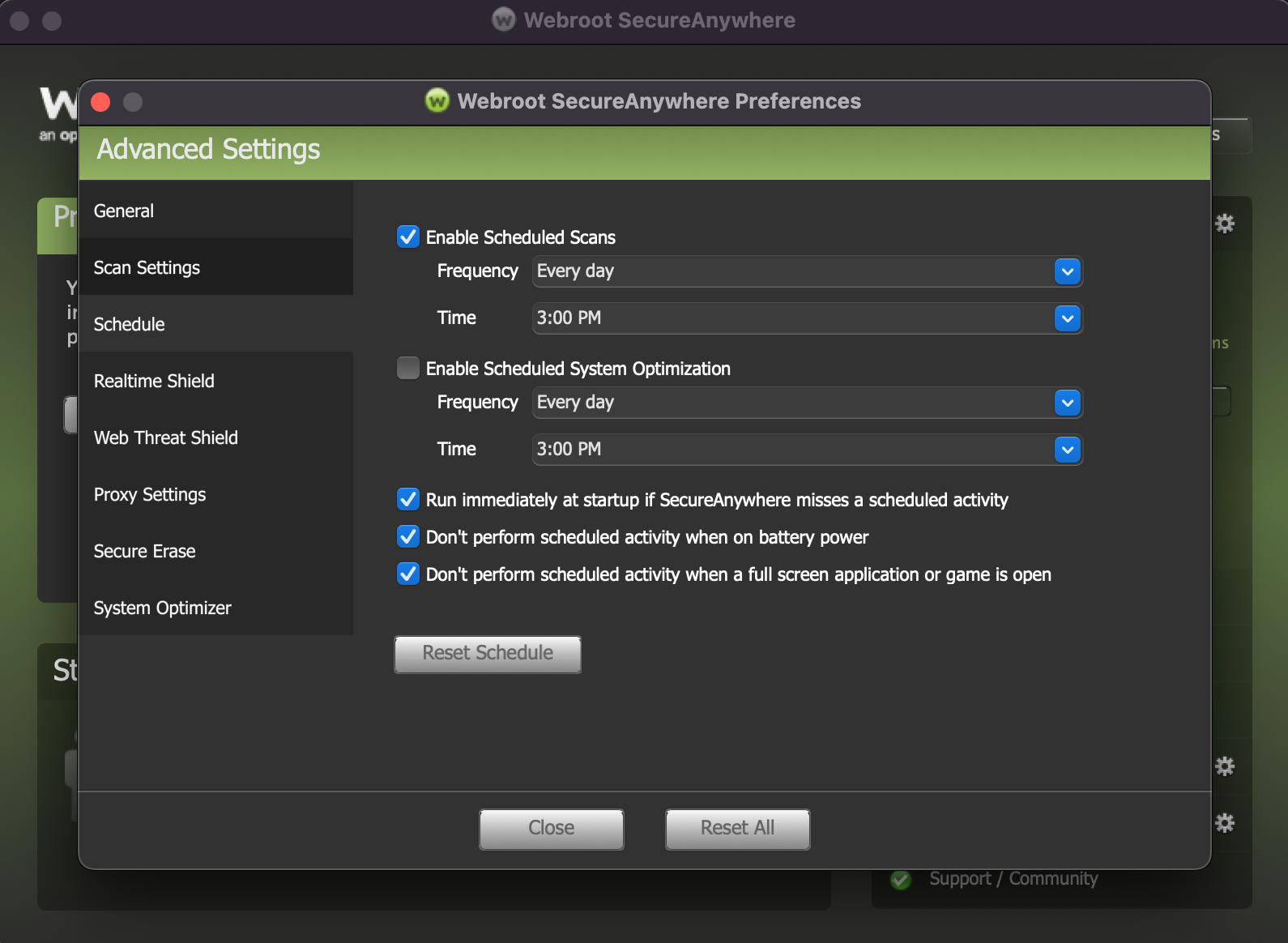
When running a full scan, Webroot Internet Security Plus took anywhere from three to six minutes to scan over 900,000 files while a quick scan took about one to two minutes. When we scanned a second computer (also a Mac), it took 3 minutes and 36 seconds to scan about 739,000 files.
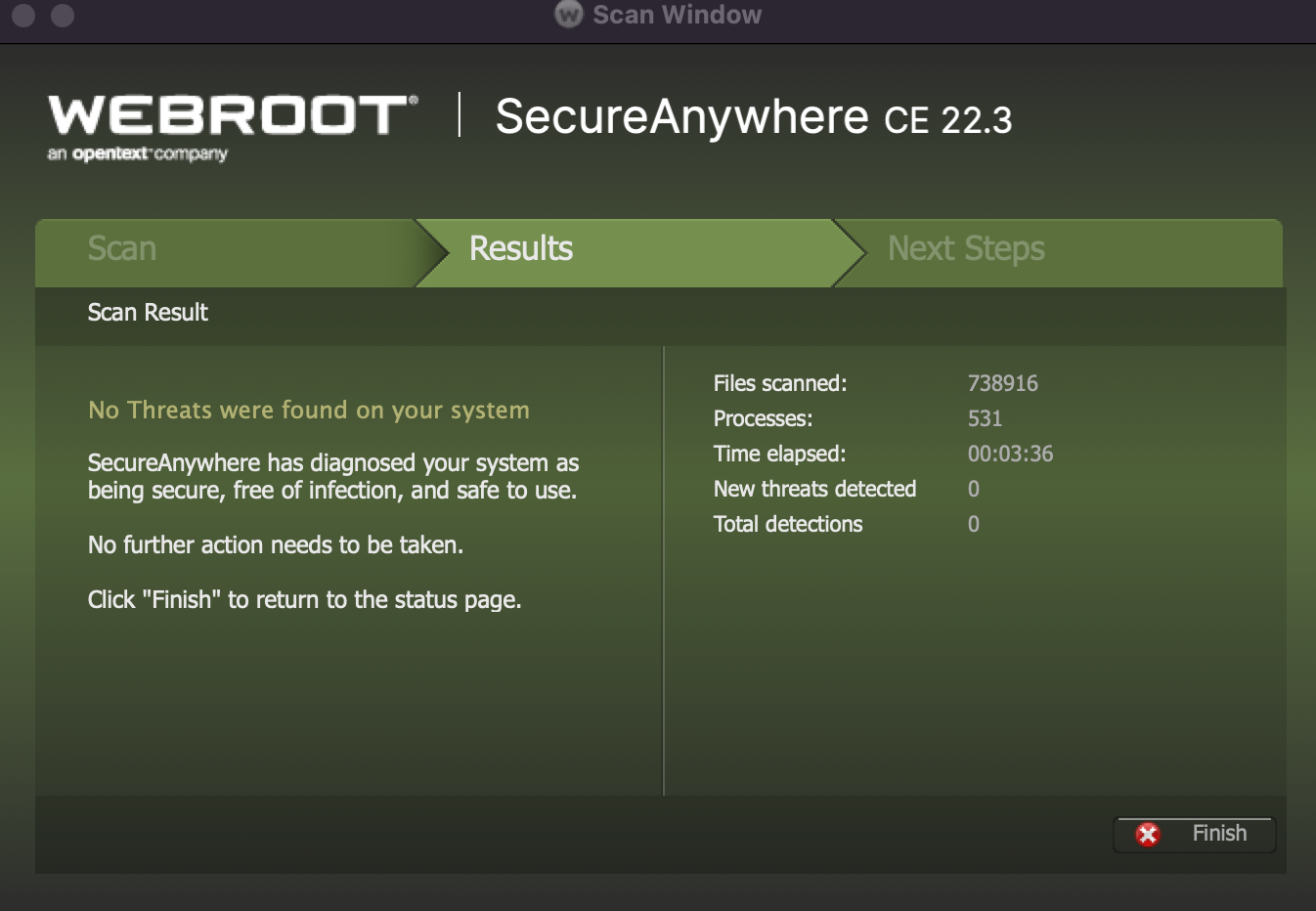
We think that’s pretty fast, considering an average full scan takes from thirty minutes to several hours.[1] Many antivirus solutions are also notorious for major device slow-downs while they execute a deep scan. Of course, the time it takes is dependent on the number of files you scan, but Webroot’s still lightning fast in comparison.
Webroot has a few settings you can flip on to reduce resource usage or delay scans while you’re busy ducking and rolling during a boss fight in Elden Ring.
An interesting note about the quick scan or full scan option is that when you run the scan, the System Analyzer checks your system for threats and hardware configuration. Once it’s finished, it gives you a detailed report on what the scan finds.
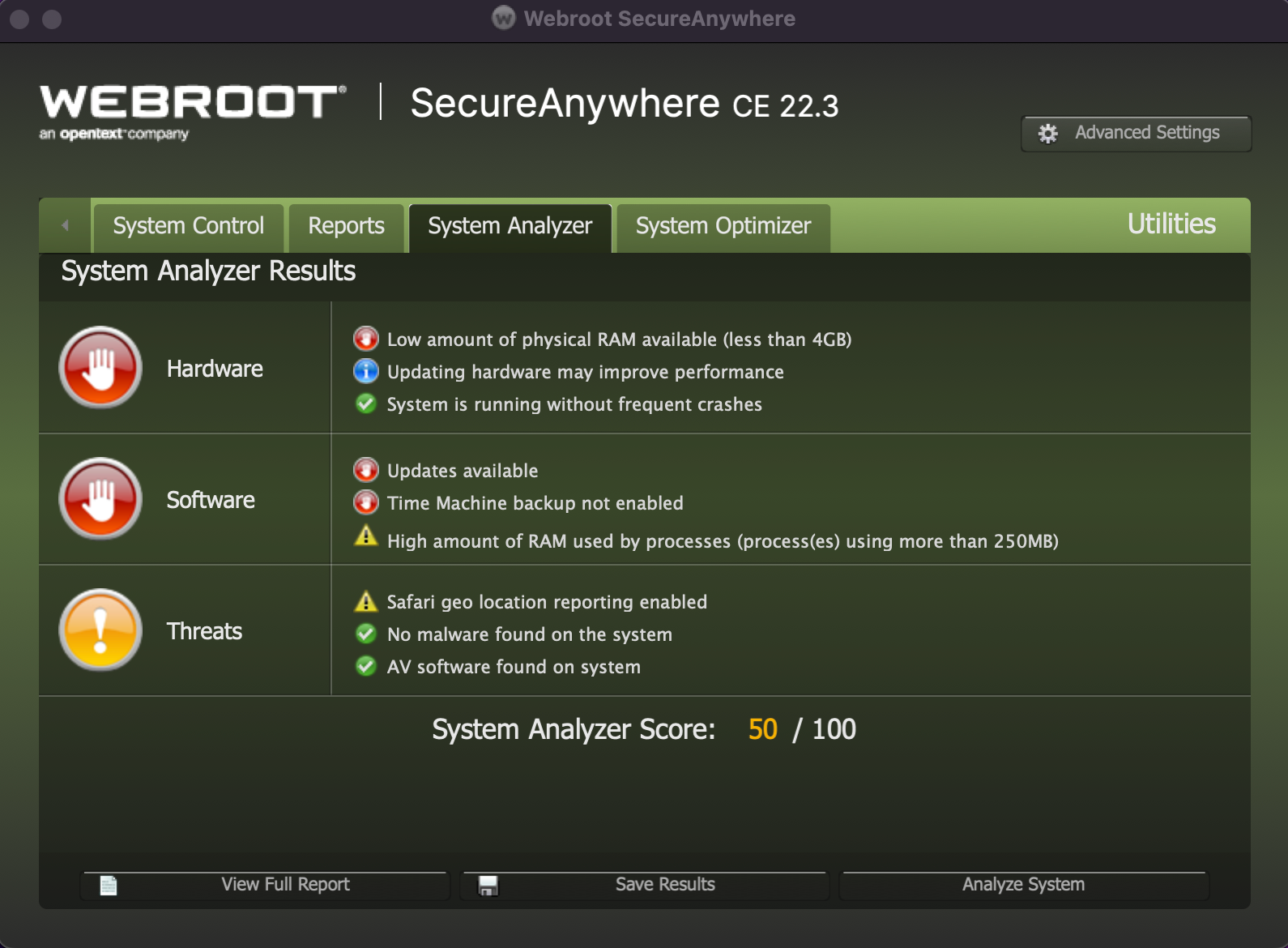
Phishing protection
All Webroot security software comes with the Web Threat Shield that you can turn on to enable real-time anti-phishing monitoring. You’ll also need to download the browser extension in order for Webroot to flag unsecure sites as part of its phishing protection.
We downloaded the Chrome browser extension and entered our Webroot keycode. Our Google search results were automatically updated to show whether a site was reputable or not (indicated by a green checkmark). There was no need to restart Chrome or our device.

We felt more secure when going online because the program works to keep your personal information safe from spyware, keyloggers, and other internet threats. The ease of use is attractive as there are no special security settings to go into other than the checkbox mentioned above. It’s simplistic, and in no time you’re ready to guard against phishing attacks.
When running the virus scan without phishing protection, we noted that the performance wasn’t any faster. Using the full scan option with Web Threat Shield turned on, Webroot still scanned all files in under four minutes.
Since the antivirus scan was as fast when checking for phishing as it was without Web Threat Shield turned on, we recommend keeping that feature turned on for best online security.
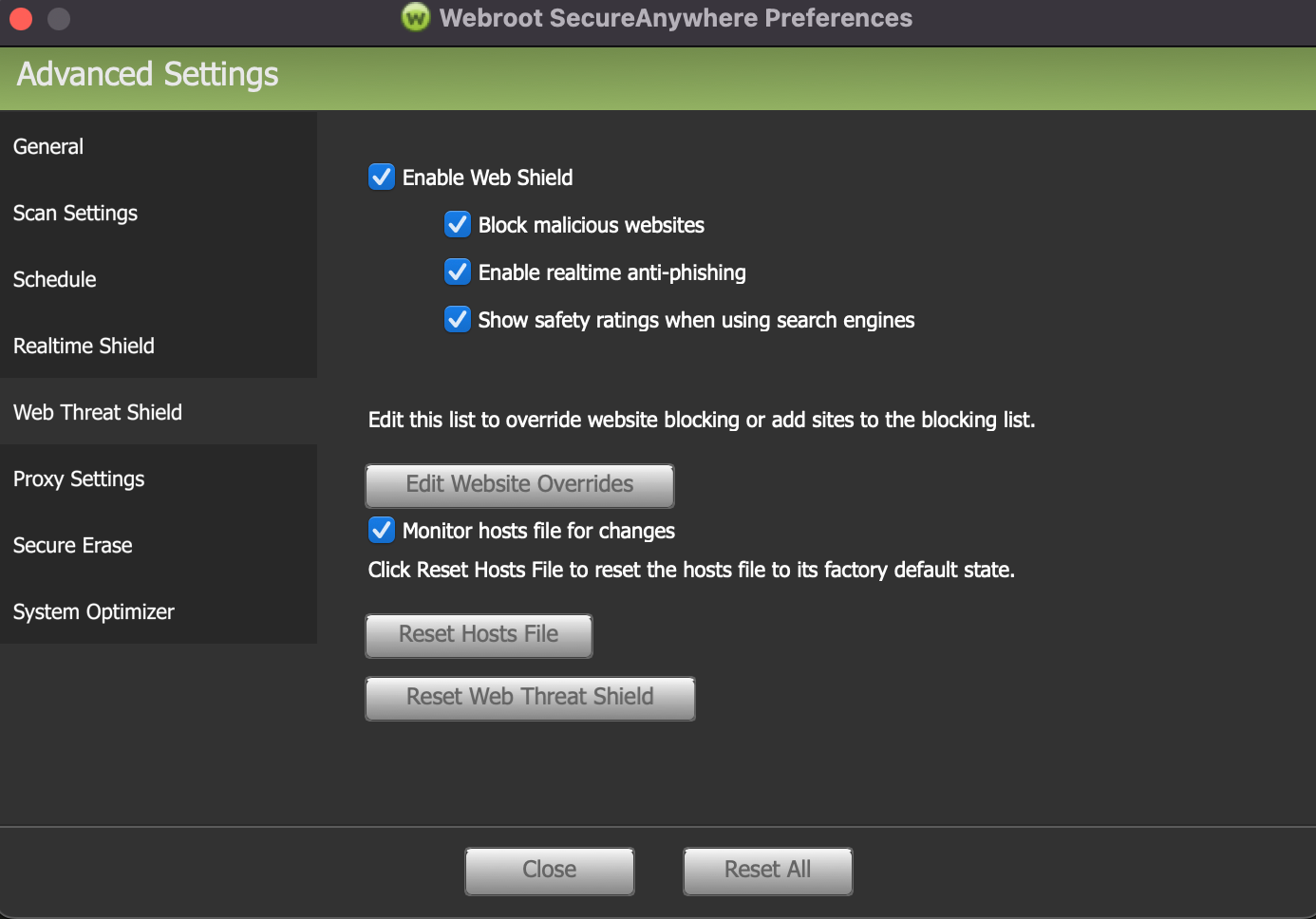
Firewall
All three Webroot antivirus plans come with a firewall and network connection monitor. Since a firewall checks all the information that goes in and out of your computer for malicious processes, it’s a good tool to have in combination with antivirus protection.
If you’re a Mac user, the interface will be slightly different. When you go to the main interface, under Mac Security you’ll see the Quarantine feature in the place of the firewall.
According to the Webroot site, the firewall works with the Windows Defender firewall to monitor traffic. The Webroot firewall checks the data traveling from your computer ports, while Windows Defender monitors data going into your computer.
Webroot’s firewall comes already configured — all you have to do is turn it on. Your regular activities won’t be disrupted since the firewall works in the background. If the firewall detects any suspicious traffic, you get an alert and can then block the traffic or allow it to run.
Real-time protection
Webroot offers real-time protection to identify and block threats as soon as they appear.
The Realtime Shield feature is found in the Advanced Settings section. It has many options you can select to block ransomware and other malicious threats, including the option to automatically scan files any time they’re modified.
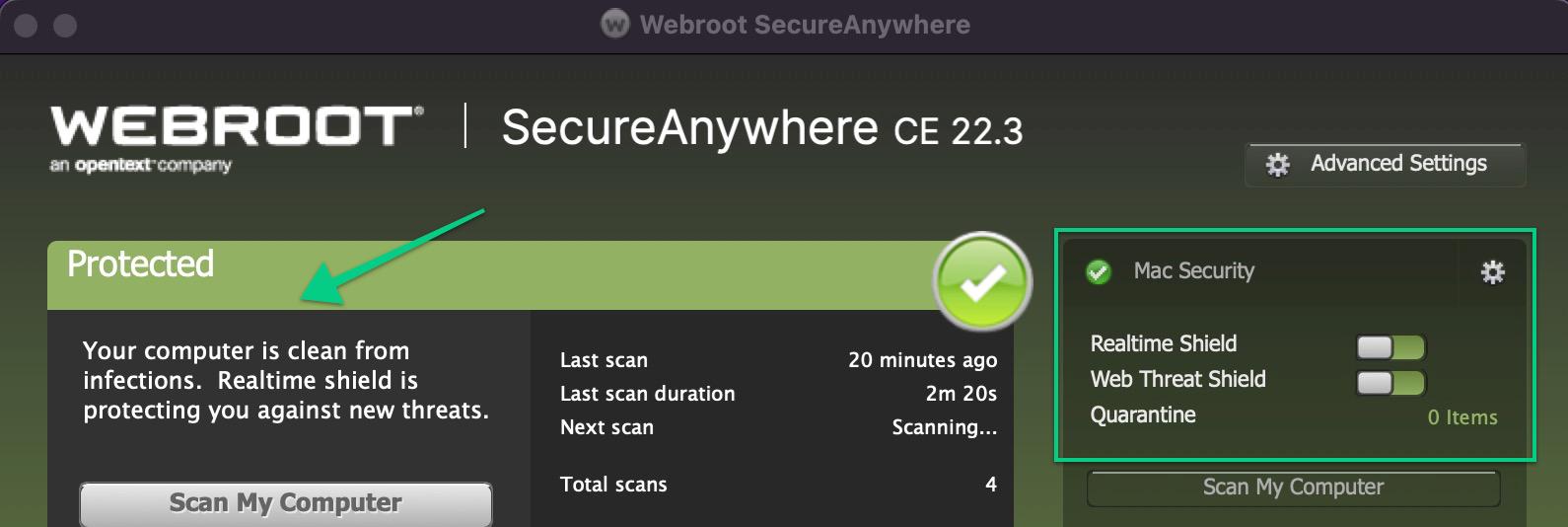
Webroot also protects against keyloggers with the secure keyboard entry mode option under Realtime Shield. Though many Mac users noted it can interfere with keyboard shortcuts in programs like Adobe Creative Suite. If you run into this issue, Webroot lets you pause secure keyboard entry.
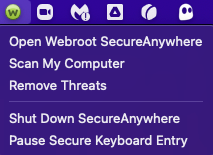
The Web Threat Shield also has settings for real-time protection, including real-time anti-phishing and blocking malicious sites.
Ransomware protection
All Webroot antivirus plans come with ransomware protection and a unique way of dealing with suspected ransomware.
If the antivirus program comes into contact with an unknown app, it separates the app into a bubble that prevents it from making any system changes to your device. Webroot also monitors unknown apps and keeps track of what changes they make to your system, almost like a backup.
Webroot uses its cloud-based intelligence to check the app and, if it's malicious, reverses the app’s actions so no harm is done to your computer. It then adds the malicious app to the known malware list and denies future access to that threat.
Rather than using a standard file detection method, Webroot uses the power of cloud computing.
What that means for you is that this antivirus program is proactive, rather than reactive in its approach to ransomware. It uses real-time monitoring to check for threats and categorize files and processes as malicious, unknown, or good.
Password manager
Both Webroot Internet Security Plus and Internet Security Complete include the LastPass password manager as part of your Webroot subscription. When you use LastPass, you get a faster — and more secure — way to access your programs that require passwords.
You don’t have to remember all those tricky passwords you’ve had to set up for various accounts. Once you set up your passwords, LastPass remembers them and auto-fills them for you.
LastPass can also generate strong passwords so you don’t have to be bothered creating something new and complex. This can be useful when you have several different accounts and don’t want to log in and retype multiple passwords frequently.
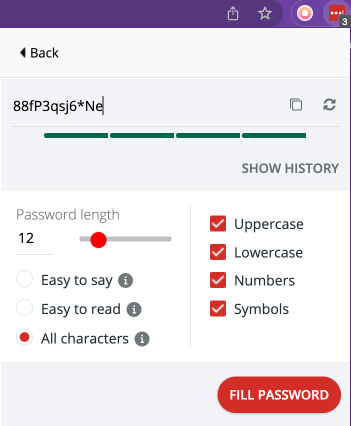
One of the pros to using LastPass is that you can also store credit cards, membership IDs, and addresses to keep them safely available whenever you need them. You can access them anywhere you go from your device or browser.
The only downside to LastPass is if you want to overhaul your passwords, you may need to change each of them one at a time. Some password managers let you automatically update several at once. But this isn’t something you’d have to do often, so it’s a minor inconvenience of the program.
Bonus features
When you purchase a Webroot antivirus plan, it comes with additional features you may not get with other programs. We’ve covered the cloud-based technology, but it also offers a file shredder feature, similar to the one offered by McAfee antivirus.
To access this feature, you go to the Advanced Settings tab, then select the Secure Erase option. Here you can choose the level of security to use when removing files.
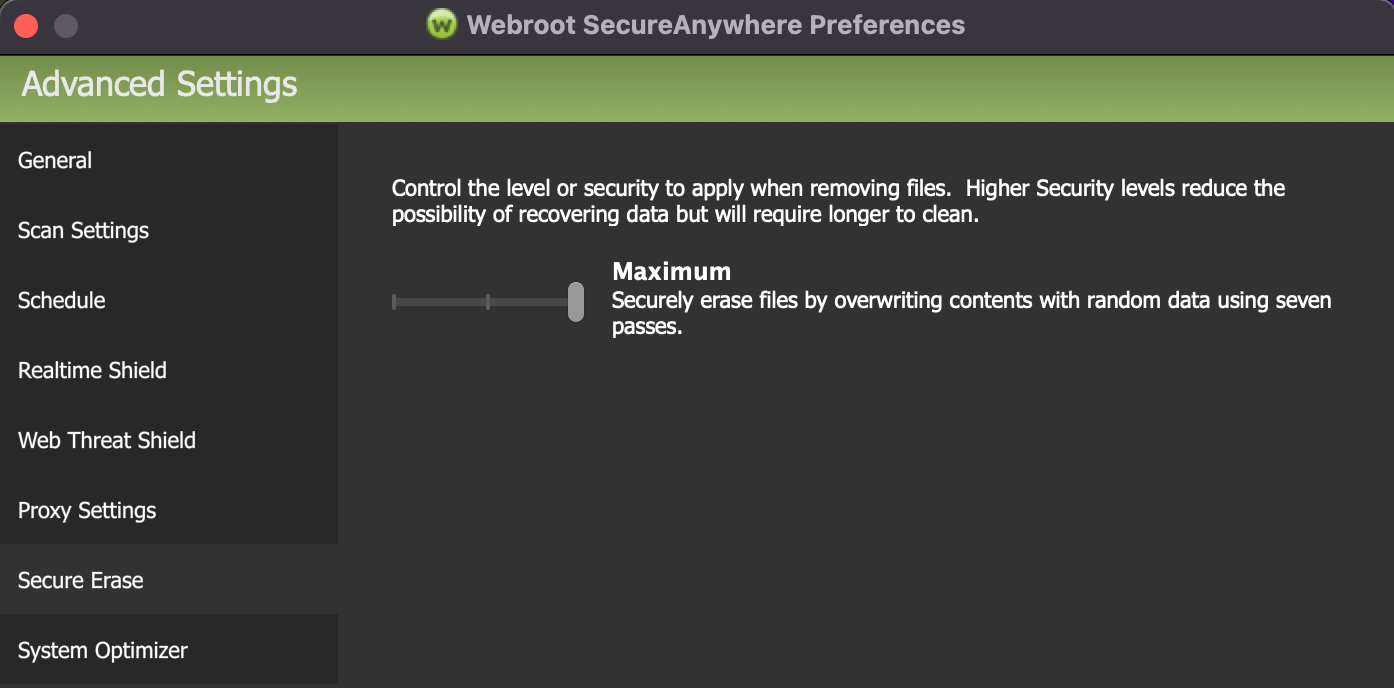
One thing we did notice that was missing from the Internet Security Plus option is the cleaning and system performance improvement function. To get this feature, you’d need to pay a little more and get the Internet Security Complete version. This feature comes standard with some antivirus software, like Bitdefender.
Speaking of the different Webroot plans, you'll need to upgrade to Internet Security Plus or Internet Security Complete to get protection for your mobile devices, as well as protection for Chromebook if you have one.
This feature seems like it should come standard even with the lowest-price plan, especially since a majority of us regularly use smartphones to access the internet.
Webroot WiFi Security VPN
You can also add a virtual private network (VPN) to your Webroot security suite. The WiFi Security feature encrypts your online traffic and hides your IP address to protect your device even on unsecured public Wi-Fi networks. It also comes with web filtering on Microsoft Windows, Mac, and Android devices.
We didn't get a chance to test the Webroot WiFi Security VPN, but it's priced at $59.99 a year for three devices. (Or $79.99 a year for five devices.) This is a tad more expensive compared to the annual pricing of several other well-known VPN brands, including NordVPN and Surfshark, both of which also offer additional cybersecurity features.
If your primary goal is to have a VPN, we recommend checking out the above VPN providers instead.
Webroot antivirus test results
Webroot was tested by a third-party site, SE Labs, for protection accuracy, legitimate accuracy, and false positives.[2] These lab tests also looked at the threat types and separated them into general and targeted attacks. Another well-known third-party antivirus test lab, AV-TEST, did not publish results for Webroot in its latest report.
Webroot scored much lower when testing targeted attacks, only catching 76% of them. Webroot did much better with general attacks, catching 97%, leaving the overall attack score at 86.5%.
That score is lower than other antivirus programs tested, like Microsoft Defender and Norton Lifelock 360. Overall, it isn’t a bad score, but it has a ways to go to compete for the top spot.
Webroot antivirus SE Labs results April–June 2022
| Test type | Score (%) |
| Protection accuracy | 86 |
| Legitimate accuracy | 100 |
| Total accuracy rating | 95 |
Our Webroot Internet Security Plus antivirus experience
Overall, our Webroot antivirus experience was a success. We found the program to be fast when performing scans and didn’t notice a difference in how our system functioned during the process.
Device scans
We ran multiple scans using both full and quick scans, changing some of the options along the way to test for fluctuations in performance.
The full scan took between three and four minutes, and the quick scan ran in less than three. We didn’t notice any difference after making those changes. We like the cloud-based architecture that allows Webroot to scan without affecting our device performance.
Luckily, Webroot didn’t detect any viruses on our computer. We were almost hoping it would, just to test the quarantine feature, but in this case, no news is good news.
Using the System Optimizer and Analyzer
When using the System Optimizer, we noticed that it took a little longer to perform. That could be due to the program looking through hundreds of thousands of files to free up hard drive space. Still, it only took a few minutes (less than 10) to go through everything.
The System Analyzer did a good job of checking our device resources to see how our hardware and software were performing. We put it to the test, as we had multiple other programs running at the same time. We also had numerous browser tabs open to see how much RAM our processes were using. In less than a minute, we received a score.
We like the System Analyzer full report feature where you can view the complete results to get a better picture of what needs improvement. You can also see what isn’t working well and what doesn’t need to be addressed.
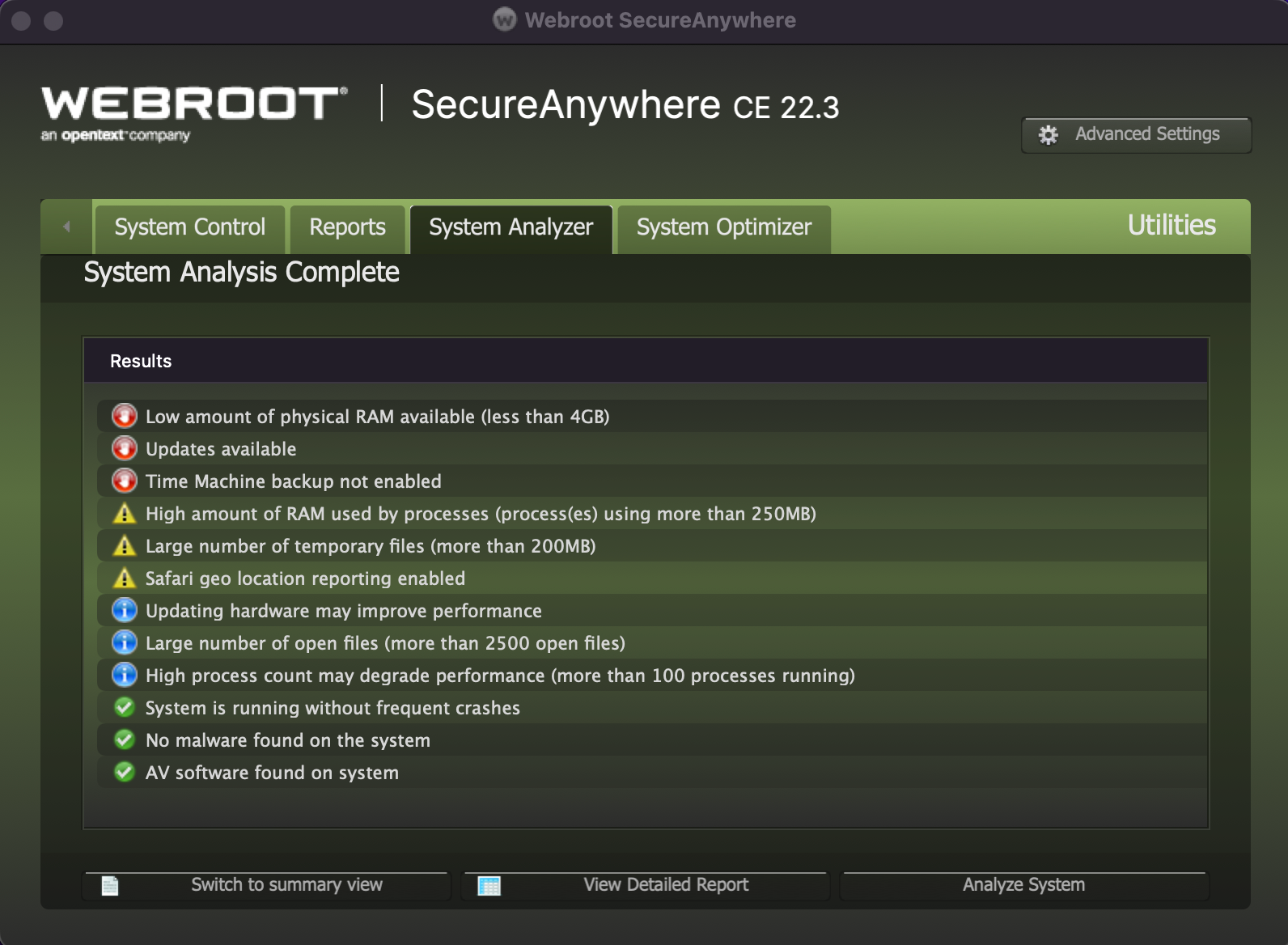
We did notice the scan showed an abnormally large amount of open files. According to other users in the Webroot community, that is a common issue for Mac users.[3] So don’t panic if you get the same notification.
Webroot compatibility
Webroot is compatible with most devices, and it also offers mobile apps for Android and iOS devices as well as Chromebooks if you grab the Internet Security Plus or Internet Security Complete plan. A heads up, though: you may need to update your system to be able to use Webroot.
- Android 8 or higher
- iOS 13 or higher
- Windows 7 and later
- macOS 10.14 Mojave and later
- Internet Explorer version 11 and newer
- Microsoft Edge (partial support)
- Mozilla Firefox version 3.6 and newer
- Opera 11 and newer
Webroot works with many platforms and includes browser extensions you can download with your subscription.
With the Internet Security Plus and Internet Security Complete plans, you can get apps for your Chromebook and the Webroot Mobile Security app that can protect you while using your iOS or Android device.
Webroot customer support
During the testing of the antivirus software, we did email support and got a fast automated message back. These return emails generally take 24 hours, and we got our reply 48 hours later. (Not including the weekend.)
If your email response is taking a while, there’s also a Webroot Knowledge Base that you can use to search for answers to your antivirus questions. We tested it out and received many possible suggestions for questions regarding ransomware and identity theft.
Additionally, you can contact Webroot on Facebook or Twitter — or ask fellow Webroot users on the forums.
Webroot antivirus cost
Webroot antivirus comes in three different options: AntiVirus, Internet Security Plus, or Internet Security Complete. As you might expect, the lowest-cost version comes with fewer features. The top-tier version comes with everything the antivirus software offers.
- The cheapest option for Webroot: AntiVirus plan for $39.99 a year (currently marked down to $23.99)
- The most expensive option for Webroot: Internet Security Complete plan for $79.99 a year (currently marked down to $47.99)
The discounted price for Internet Security Complete is almost half the price of some other antivirus software, such as Kaspersky’s Premium Suite, which normally costs $99.99 a year. With the features you get, Webroot antivirus is worth the cost, especially with the prices marked down right now.
Webroot antivirus plans and prices
| AntiVirus | Internet Security Plus with AntiVirus | Internet Security Complete with AntiVirus | |
| Price per year | $23.99/yr | $35.99/yr | $47.99/yr |
| # devices supported | 1 | 3 | 5 |
| Manual and auto scan | |||
| Phishing protection | |||
| Firewall | |||
| Real-time protection | |||
| Ransomware protection | |||
| Password manager | |||
| Performance optimization tools | |||
| Device cleaning | |||
| Online activity eraser | |||
| Details | Learn more | Learn more | Learn more |
Prices as of 8/12/2022.
Webroot antivirus FAQs
Is Webroot trustworthy?
Webroot is trustworthy antivirus software. It offers a 70-day money-back guarantee and a free trial to test the product. It also scored a 95 on the accuracy rating from SE Labs.
Is Webroot better than McAfee?
You may or may not feel Webroot is better than McAfee. That could depend on factors like cost and security options. If you’re more focused on anti-phishing and identity theft, Webroot is the better option.
Is Webroot as good as Norton?
Webroot has been ranked higher than Norton in independent testing. Again, this could depend on different factors, so it’s best to decide for yourself what’s important to you. One of the features that makes Webroot so popular is its low impact on device resources.
Has Webroot been hacked?
Webroot was hacked in 2019, but in response, Webroot forcibly enabled two-factor authentication on all user accounts once the hack was detected to prevent further damage.
Bottom line: Is Webroot antivirus good?
With so many features and prices that are affordable for any budget, Webroot is a good antivirus software to get if you’re serious about security but don’t want to dig deep into your computer settings or your pockets.
The benefits of this antivirus are ease of use with tons of features at a reasonable price. If you want a low-cost, no-fuss antivirus, you truly can’t go wrong with Webroot.
-
Fast, cloud-based scans
-
Ransomware reversal technology
-
Internet Security Plus plan required to clean device
But if you’re on the hunt for a more robust anti-malware program, such as one that comes with a built-in VPN, webcam protection, or other security features, you may want to check out our list of the best antivirus software.
-
Fast, cloud-based scans
-
Ransomware reversal technology
-
Internet Security Plus plan required to clean device
[1] What Is a Quick and Deep or Full Antivirus Scan?


